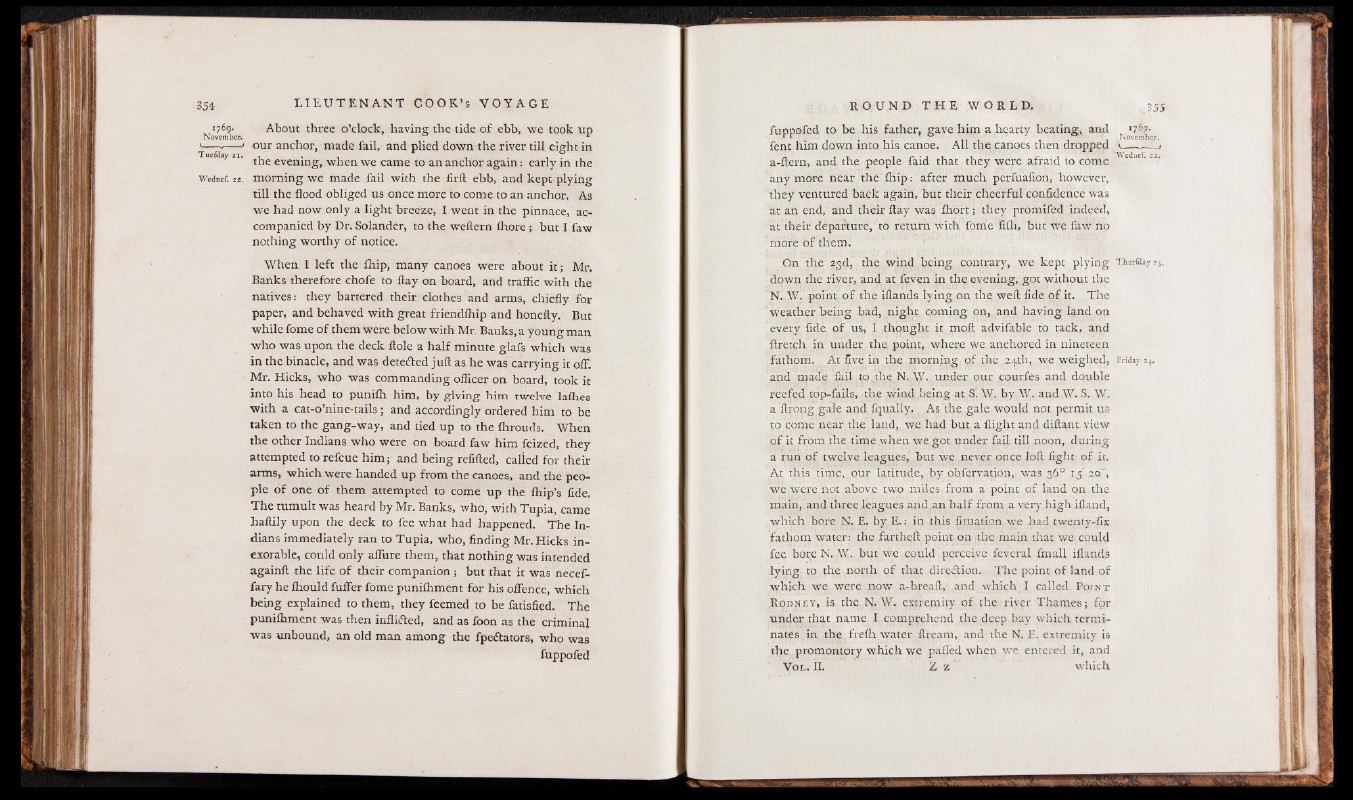
About three o’clock, having the tide of ebb, we took up
our anchor, made fail, and plied down the river till eight in
the evening, when we came to an anchor again: early in the
morning we made fail with the firft ebb, and kept plying
till the flood obliged us once more to come to an anchor. As
we had now only a light breeze, I went in the pinnace, accompanied
by Dr. Solander, to the weftern fhore; but I faw
nothing worthy of notice.
When I left the fhip, many canoes were about it; Mr.
Banks therefore chofe to flay on board, and traffic with the
natives: they bartered their clothes and arms, chiefly for
paper, and behaved with great friendlhip and honefty. But
while fome o f them were below with Mr. Banks, a young man
who was upon the deck ftole a half minute glafs which was
in the binacle, and was detected juft as he was carrying it off.
Mr. Hicks, who was commanding officer on board, took it
into his head to punifh him, by giving him twelve lalhes
with a cat-o’nine-tails ; and accordingly ordered him to be
taken to the gang-way, and tied up to the fhrouds. When
the other Indians who were on board faw him feized, they
attempted torefcue him; and being refilled, called for their
arms, which were handed up from the canoes, and the people
of one of them attempted to come up the Ihip’s fide.
The tumult was heard by Mr. Banks, who, with Tupia, came
haftily upon the deck to fee what had happened. The Indians
immediately ran to Tupia, who, finding Mr. Hicks inexorable,
could only aflure them, that nothing was intended
againft the life of their companion; but that it was necef-
fary he fhould fuffer fome punifliment for his offence, which
being explained to them, they feemed to be fatisfied. The
punilhment was then inflisfted, and as foon as the criminal
was unbound, an old man among the fpe&ators, who was
fuppofed
fuppofed to be his father, gave him a hearty beating, anti ^ >769-
fen t him down into his canoe. All the canoes then dropped S,__„— j
a-ftern, and the people faid that they were afraid to come • . ner‘ -z-
any more near the fhip: after much perfuafion, however,
they ventured back again, but their cheerful confidence was
at an end, and their ftay was Ihort; they promifed indeed,
at their departure, to return with fome filh, but we faw no
more of them.
On the 23d, the wind being contrary, we kept plying Thurfdayz;.
down the river, and at feven in the evening, got without the
N. W. point of the iflands lying on the weft fide of it. The
weather being bad, night coming on, and having land on
every fide of us, I thought it moft advifable to tack, and
ftretch in under the point, where we anchored in nineteen
fathom. At five in the morning ,of the 24th, we weighed, Friday 2+.
and made fail to the N, W. under our courfes and double
reefed top-fails, the wind being at Si W. by W. and W. S. W.
a ftrong gale and fqually. As the gale would not permit us
to come near the land, we had but a flight and diftant view
of it from the time when we got under fail till noon, during
a run of twelve leagues, but we never once loft fight of it.
At this time, , our latitude, by obfervation, was 36° 15' 20",
we were not above two miles from a point of land on the
main, and three leagues and an half from a very high ifland,
which bore N. E. by E.: in this fituation. we had twenty-fix
fathom water: the fartheft point on the main that we could
fee boi;e N. W. but we could perceive feveral fmall iflands
lying to the north of that direction. The point of land of
which we were now a-breaft, and which I called Point
Rodney, is the N. W. extremity of the river Thames; for
under that name I comprehend the deep bay which terminates
in the frefh water ftream, and the N. E. extremity is
the promontory which we pafled when we entered it, and
V ol. II. Z z which